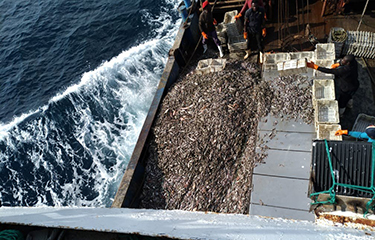The Chinese owners of trawlers operating in West Africa are denying Ghana millions of dollars in license revenue and circumventing rules on payment of financial penalties for fisheries related infringements, according to a new report.
Chinese state companies have been cited in the report by Environmental Justice Foundation (EJF), which alleges the companies are fleecing the West African country’s ocean resources by camouflaging as locally incorporated trawler owners that pay lower license fees and penalties for engaging in illegal fishing activities.
The report details how the Chinese control up to 93 percent of the trawl vessels in Ghana, a country that is now losing between USD 14.4 million and USD 23.7 million (EUR 12.1 million and EUR 20 million) annually in fishing license fees and fines from trawlers. Ghana’s total approved budget for the Ministry of Fisheries and Aquaculture Development for 2017 and 2018 was GHS 119.5 million (USD 20.7 million, EUR 17.6 million).
The EJF report said state-owned Shandong Zhonglu Oceanic Fisheries Co., one of the dominant Chinese companies in Ghana’s trawl-fishing sector, reported an operating revenue of USD 164.5 million (EUR 139.6 million) in 2019, while also receiving USD 3 million (EUR 2.5 million) in Chinese subsidies for overseas fishing.
Two other Chinese companies – Dalian Mengxiu Ocean Fishery Co. Ltd. and Pong Cheng Marine Fishery Co. Ltd. – controled up to 44 percent of the licensed trawl vessels in Ghana in 2019, with each owning between 15 and 20 locally-registered bottom-trawlers.
By operating under the Ghanaian flag, the Chinese companies are hiding under locally incorporated entities, and are paying very low licensing fees and avoiding full compliance with financial penalty stipulations for fisheries-related infringements, according to the report.
“This opacity over ownership allows Chinese corporations to pay well below the market value for access to Ghana’s ocean resources, as well as commit illegal fishing offenses without fear of significant repercussions,” the report said.
Where other West African countries that border the Atlantic Ocean are earning good revenue from trawl vessels’ licensing fees, EJF’s study said that, in Ghana, revenues “are substantially lower than other coastal states in the region, and insignificant considering that many trawlers operating in Ghana are beneficially owned by large, in some cases state-controlled, Chinese corporations.”
“Safeguarding the country’s fisheries requires urgent intervention at high levels of the Ghanaian government to introduce reforms that improve transparency, so it is clear who is benefiting from fishing access, what and how much they are fishing, how much they are paying, and what these funds are used for,” EJF Executive Director Steve Trent said. “This failure to set reasonable fines and fees not only results in a considerable loss of revenue, but presents a critical threat to the sustainability of the fishery, and in doing so, endangers national food security and countless livelihoods.”
EJF’s report recommends cooperation between the governments of Ghana and China in ensuring “the perpetrators and beneficiaries of illegal fishing are identified and held to account for their acts, through implementation of an enforcement regime that imposes proportionate and dissuasive sanctions through transparent processes and ensures that fishing licenses and government subsidies are withdrawn for entities that engage in illegal practices.”
The move by China to tighten regulations governing fishing fleets from 2020, the first such decision in 17 years, “provides the country with the legal basis and opportunity to scrutinize the operations of private and state-controlled fishing companies in Ghana and bring its “hidden” fleet into compliance with national and international law,” the EJF report said.
The report suggests Ghana should focus on reducing the overcapacity of the trawl vessels on its waters by aligning the country’s licensing with those of neighboring countries.
“Through aligning license fees with those applied by Guinea, for instance, Ghana could address fleet overcapacity and reduce trawler numbers by around 87 percent from 75 to 10 vessels, yet double the revenue generated in 2018," the report said.
Photo courtesy of the Environmental Justice Foundation







